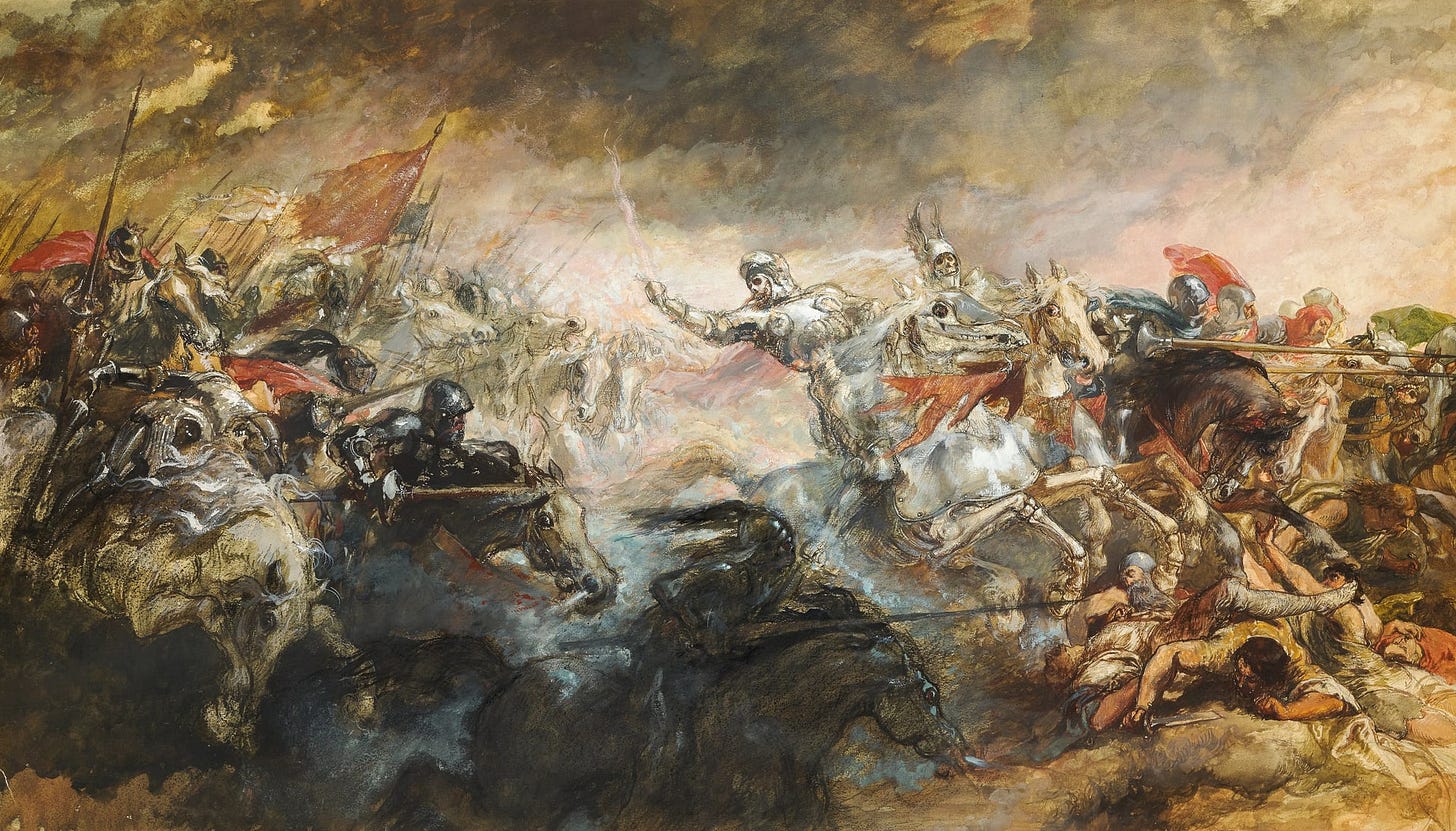Subscribe or Upgrade
Get posts like this sent directly to your inbox so you don’t miss anything or upgrade to either the Supporter or Sponsor Plan to unlock the archive and receive bonus content.
Have You Seen the News?
I was in my study on Wednesday working on the Sunday sermon when my twenty-two-year-old son walked in with a concerned look on his face. "Have you seen the news?" At the time, I had not. But now, everyone has.
It seems as if 2021 is a rude awakening to those of us who hoped 2020 would not overflow into the new year. But if we understand history correctly, the problem is not that 2020 has continued. What we are experiencing is an overflow of the events that took place in a garden way back in the early pages of Genesis. Riots, violence, injustice, political turmoil, hatred, division, conflict, jealousy, factions, and the thirst for power is nothing new in the history of humanity. Sadly, it is par for the course.
Thankfully, the Bible gives us direction for how to process living in a broken, sinful world. For this direction, I want to take us back to a time not long after the first human rebellion took place. The text is Genesis 6:5-8. It is a passage that I think will help us process the stress and grief of 2020, 2021, and every year to come.
5 The Lord saw how great man’s wickedness on the earth had become, and that every inclination of the thoughts of his heart was only evil all the time. 6 The Lord was grieved that he had made man on the earth, and his heart was filled with pain. 7 So the Lord said, “I will wipe mankind, whom I have created, from the face of the earth—men and animals, and creatures that move along the ground, and birds of the air—for I am grieved that I have made them.” 8 But Noah found favor in the eyes of the Lord.
Three Implications
As we reflect on this passage, it may help to view it from the perspective of the Lord, of humanity in general, and of Noah in particular. Looking at the text from these separate angles, three implications stand out that I think can help guide us into the coming 2021.
1) It is right to lament the ravages of sin.
Verse 6 reveals the heart of the Lord as he looks upon human depravity in verse 5, saying, “The Lord was grieved.” We read further that “his heart was filled with pain.” These are expressions of deep sorrow and anguish. They are the emotions of lament.
If the Lord felt this way, certainly we can, too. And should. Expressing grief with lament is just being honest about our emotional reaction to living in a broken world.
In her essays on lament, Anne Henegar says that not to lament maybe spiritually harmful because honesty with God is critical for a vital spiritual life. She writes, “All relationships depend on trust and honesty to thrive. This is especially true of our relationship with God. Refusing to be honest with him breeds distance and distrust. Not lamenting is the equivalent of giving God the silent treatment, concealing your true heart. When you don’t tell him what you care about, you tend to assume he doesn’t care. A wedge grows between you, and the relationship becomes anemic.”
From this perspective, lamenting sin is a way of connecting with the heart of the Father. He is not offended by our honesty. Rather, he shares in it.
In view of the events of the past year and week, I am lamenting many things.
I lament riots and violence.
I lament domestic abuse.
I lament racism and injustice.
I lament the corruption of the gospel in what is called religious or Christian Nationalism.
I lament a culture that allows and at times even seems to celebrate the constitutional right of Americans to kill infants in the womb.
I lament the lives that have been lost to Covid and I lament what Covid has done to divide churches and destroy friendships.
I lament the anger, divisiveness, and mistrust that permeates our entire culture.
These things grieve my heart. I believe they grieve the heart of God, too.
I mostly lament that I am part of the problem.
2) The evil in the world reflects the evil within me (and within each one of us).
In verse 7, the Lord is ready to bring a final judgment upon humanity. Yet, when I look at the population of sinners being described in Genesis 6, I see their condition in me. In my flesh, I deserve to be wiped out, too. The evil in the world reflects the evil within me.
I don’t want to admit that. I’m sure you don’t want to admit that either, or at least want to put qualifiers on it. “Of course, I’m a sinner. But not like those people.” But for me to profess anything less than being equally worthy of condemnation before the law of God along with the rest of humanity is hypocrisy.
In fact, each of us has the seed of every sin residing in our flesh. Given the right environment, those seeds can sprout and grow into the most grotesque sins imaginable. Sometimes, these weeds are fertilized by our context. This is why inner-city crime differs from suburban or rural crime.
The truth is my sinful condition is far worse than I think. I’m not a theoretical sinner or a former sinner, but a real, live, right now sinner who, in the flesh, is blinded to probably 99.9% of my sin. The same is true for you.
But do not despair. Although our human condition is worse than we think it is, there is good news. God’s grace is far better than we can imagine. You see, being blinded to 99.9% of my sin means that I am blinded to 99.9% of God’s grace, too!
This is the third truth that guides us into 2021 and beyond.
3) There is hope in the gospel.
By the end of verse 7, it seems as if human history is going to be short-lived. Yet before the text concludes, we read something that alters the course of what we expect. No one can blame God for wanting to put an end to the human experiment. Then in verse 8, like Superman swooping in to rescue Lois Lane, we read, “But Noah found favor in the eyes of the Lord.”
We may be tempted to think that Noah somehow was different from the rest of humanity and worthy of saving from the calamity to come. But two Hebrew words in verse 8 completely undermines that hypothesis. The words translated “found favor” are masa and hen. In addition to “find,” masa means “to meet” and “obtain” while hen, in its literal sense, conveys the idea of “grace.” Therefore, when we put them together, we discover that Noah did not deserve mercy, he received it as a gift. He had been found by grace.
Now we have a context for verse 9, which tells us that Noah was “a righteous man, blameless in his generation.” Why was he different? What caused him to stand out? I believe the good in his life was due to what he found. He didn’t earn it or deserve it. Apart from the hen of God, Noah and his family would have been wiped out, too.
And you know what happens next. The Lord gives Noah instructions for building a massive boat called an ark that would sustain life through the waters of judgment. In the New Testament, Paul would make much of the imagery we see in the flood narrative. One of his favorite phrases that is repeated over and over is that of Christians being “in Christ.” Just like Noah, his family, and two of every species were saved by being safely secured “in” the ark, so believers are saved from the future judgment to come by being safely secured “in” the ark of Jesus.
In the same way the wood of the ark provided shelter from the storm, the wood of the cross provides shelter for us. What is most astonishing about the message of the Bible is that, while we deserved to be wiped away, it is God himself who steps forward to take our place in judgment. In the act of crucifixion, Jesus satisfies the demand of justice and the record of our sins is wiped away with his blood.
This is the hope for those who lament and repent and have grown weary of sadness. This is the hope of those who grieve now, because just as the darkness precedes the sunrise, lament is the prelude to gospel hope and joy. The doors of Noah’s ark opened to a new world. So will the doors of eternity open to a new world for those in Christ—a world where lamentation will cease forever. We get a glimpse of this glorious hope in Revelation 21:1-5.
21 Then I saw a new heaven and a new earth, for the first heaven and the first earth had passed away, and the sea was no more. 2 And I saw the holy city, new Jerusalem, coming down out of heaven from God, prepared as a bride adorned for her husband. 3 And I heard a loud voice from the throne saying, “Behold, the dwelling place of God is with man. He will dwell with them, and they will be his people, and God himself will be with them as their God. 4 He will wipe away every tear from their eyes, and death shall be no more, neither shall there be mourning, nor crying, nor pain anymore, for the former things have passed away.” 5 And he who was seated on the throne said, “Behold, I am making all things new.” Also he said, “Write this down, for these words are trustworthy and true.”
If you are not in the ark of Jesus but want to get in, the doors are wide open. They will not always be, but while they are open, let me plead for you to come in with repentance, believing that Jesus has shed his own blood for your soul.
Subscribe or Upgrade
Get posts like this sent directly to your inbox so you don’t miss anything or upgrade to either the Supporter or Sponsor Plan to unlock the archive and receive bonus content.















Share this post